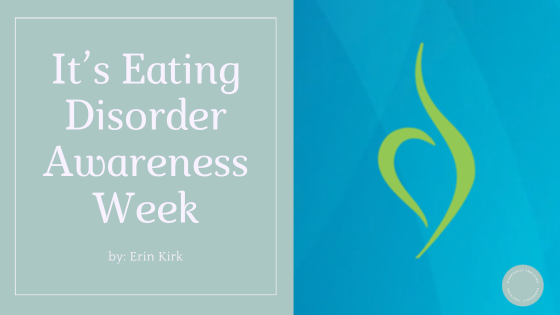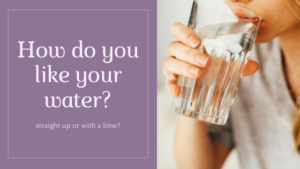In first grade I used to stand in front of a mirror and hit my hips. I hated the way my hips looked in the mirror. I used to bring a change of clothes to school because I hated how I looked in the clothes my mom dressed me in. This all started in the first grade. What first-grader knows anything about hips, much less how they look? To my knowledge, no one ever commented about my body, but somewhere along the way, I picked up a message that something was wrong with me. Something was wrong with my body and the way I looked. By the age of 15, I was restricting food and taking diet pills. I became obsessed with clean eating, orthorexia, exercise… all the things. Fast forward 30 years, hi, my name is Erin; I’ve had an eating disorder for the last 30+ years.
A few statistics you may not know about eating disorders:
- 28.8 million Americans will have an eating disorder in their lifetime.
- Eating disorders have the 2nd HIGHEST mortality rate of any mental illness.
- Eating disorders affect all genders, all races, and every ethnic group.
- Genetics, environmental factors, and personality traits all contribute to the risk of developing an eating disorder.
- Eating disorders are complex medical and mental illnesses that patients don’t choose.
In 2019, I decided to get help (for real this time), and with the guidance of my counselor, I found a dietician, Kathy, who specializes in eating disorders. This was scary, and I questioned whether I even really needed help. I didn’t look like I had an eating disorder. (Mythbuster: Eating disorders don’t have a look.)
Over time Kathy asked me to eat three meals and one snack a day. Also included was limiting my cardio to no more than 30 minutes 3 days a week and adding an additional snack on those days! At this point, I questioned why I thought this would be a good idea and which of us had lost our minds. “Who eats three meals a day?”, and “cardio is what I do!” (for hours). But I leaned into the request.
In trying to eat three meals a day, I was starting to see just how much control my ED (eating disorder) had over me. It was not easy. Oh, but it gets better; she later asked for my scale! “WTH, Kathy, my scale?!” My scale was the one thing I had left to help me (ED) maintain control. (Note: An eating disorder can begin with you trying to gain control until it starts controlling you.) I had awakened the beast, and all internal hell had broken loose. I had no idea how much my scale controlled my day. It was a tool that ED used to control what I ate, how much I ate, and if I ate. It told me how much or how long I had to exercise. It told me my worth. It has taken several years for me to unlearn the rules of ED, and I’m still unlearning. Navigating recovery in a world that is obsessed with body image, societal standards, and diet culture is another level of internal warring.
Speaking of diet culture, allow me to get on my soapbox for a moment:
The thing about diet culture is that it thrives on the illusion that there is a perfect body, a perfect diet, and a perfect way to attain it. [Diet culture is a set of myths and expectations around food and weight, which typically equate thinness to health and categorize foods into “good” or “bad” types.] We are bombarded by social media, magazines, and advertisements with photoshopped images and uneducated health and wellness influencers, creating unrealistic standards that leave us feeling inadequate. I cringe whenever I see an online health and wellness influencer peddling their magic beans and potions.
It’s so dangerous, and the majority of influencers have ZERO education in health and wellness, much less eating disorders. They don’t know who their audience is, and anyone who claims to be in the health and wellness industry has a duty and responsibility to educate themselves on eating disorders. They would think twice about what they are promoting if they did. Diet culture is not just about the food but the emotional toll it takes on us. Constantly monitoring what we eat, counting calories, and labeling foods as “good” or “bad” creates a hostile relationship with food. This obsession is a slippery slope to negative body image and eating disorders. Our worth is not determined by the size of our bodies or the foods we choose to eat.
Our worth comes only from the Lord, “And we all, who with unveiled faces contemplate the Lord’s glory, are being transformed into his image with ever-increasing glory, which comes from the Lord, who is the Spirit.” 2 Corinthians 3:18
This week is Eating Disorder Awareness Week (February 26-March 3). Sadly, it’s not advertised or talked about enough. Eating Disorder Awareness Week serves as an opportunity to educate, advocate, and support individuals affected by eating disorders. These complex mental health conditions often manifest in harmful relationships with food, body image, and self-esteem. Raising awareness can foster understanding and empathy and break the stigma surrounding these disorders. It’s a topic I’m deeply passionate about, and I make no apologies for it.
If you struggle with an eating disorder or disordered eating, I’m so sorry. I know what you are going through. I hope you have been able to get the help and support you need. If not, I encourage you to please reach out to a professional who specializes in eating disorders. If you need referrals, I’m happy to provide some contacts for you. A couple of resources for you or someone you love are the National Eating Disorder Association as well as the book “Life Without Ed” by Jenni Schaefer.
Be Well,
Erin
Erin Kirk is a dear friend who has taught me a lot about eating disorders, disordered eating and those going through the fire of one. The bravery that is needed to seek help is not lost on me and I hope that if we know someone fighting ED that we can show support and take the time to educate ourselves on how best to help. If you think you might have an ED of your own, please don’t hesitate to reach out for support and resources. Erin can be reached by email.
No content on this site, regardless of date, should ever be used as a substitute for direct medical advice from your doctor or other qualified clinician.


